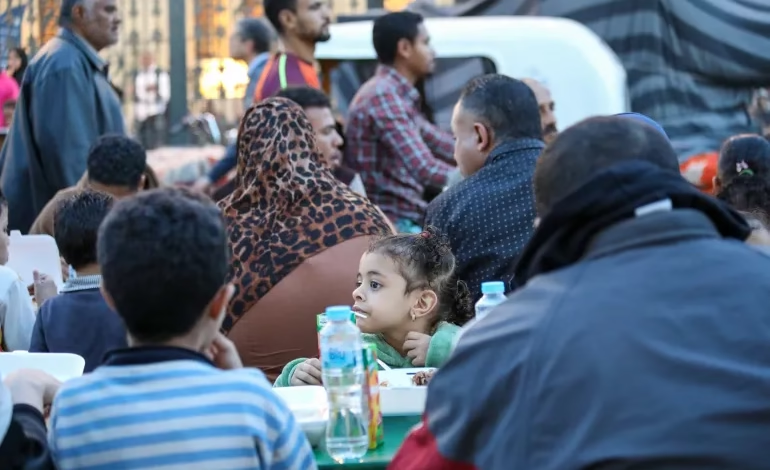Table of Mercy: How Egyptians Feed Hundreds in Ramadan

A Tradition of Generosity in Sayeda Zeinab
As the sun begins to set in Cairo’s Sayeda Zeinab neighborhood, the streets slow down. People gather near the Sayeda Zeinab Mosque, one of Egypt’s holiest sites, for a centuries-old tradition: the “table of mercy.” This communal iftar brings together volunteers and diners from all walks of life to break their fast in an atmosphere of generosity and togetherness.
A Gathering for All
The long rows of tables fill quickly as attendees hurry to find a seat. Volunteers distribute water, juice, and food boxes containing dates, rice, potatoes, and chicken. The volunteers themselves, many of whom are fasting, eat last—ensuring that the 400 guests are served first.
Among them is Hamdy, a 40-year-old coffee shop owner who has volunteered for five years. “We’re not unique. Every 10 meters, you’ll find a table of mercy. Egyptians naturally organize to help,” he says. Like many others, Hamdy balances his business with charity work, returning to his shop after iftar.
The meal packs come from donations, often from Gulf countries, but the real spirit of the event is local. Neighbors contribute in whatever way they can—some bring meat, others rice or vegetables. The kitchen is led by Mostafa, a young chef who works in charity kitchens year-round. Volunteers fill in wherever needed, ensuring that everything runs smoothly.
A Community Effort
There are no formal roles. Volunteers come and go, contributing in whatever way they can. “We leave everything to God, and it always works out,” Hamdy says, pointing skyward. The atmosphere is filled with good-natured teasing, laughter, and occasional shouts urging volunteers to distribute food faster.
One of the diners, an elderly man, explains quietly that he is attending for the first time this year. He usually spends Ramadan with family, but this time, he is alone. The table offers not just a meal, but a sense of belonging.
SUBSCRIBE
NO SPAM – JUST NEWS THAT MATTERS.
A Tradition Spanning Centuries
The “table of mercy” is an enduring Egyptian tradition, dating back to the 9th century when Ahmad Ibn Tulun is said to have organized communal Ramadan meals. The practice flourished under the Fatimid dynasty and has been preserved across generations.
In times of crisis, such as during the COVID-19 pandemic and economic hardships that followed, these tables have become even more essential. Inflation in Egypt reached 41% in 2023, making food security a pressing concern for many. The initiative at Sayeda Zeinab, started in 2020, was born from the realization that existing tables were not enough to meet the rising need.
A Table for Everyone
Hamdy emphasizes that no one is asked why they are there. “We feed anyone who passes by. All are welcome.” Among those breaking their fast are elderly couples visiting relatives in hospitals, Sudanese refugee families, and university students far from home.
Even volunteers follow the same rule—everyone gets one food box, whether they are serving or eating. As the night deepens, the volunteers finish their meals and begin cleaning up, ready to do it all over again the next day.
In Sayeda Zeinab and all over Egypt likewise, the “table of mercy” is more than a meal—it is a testament to the spirit of Ramadan, where generosity and community come before all else.








